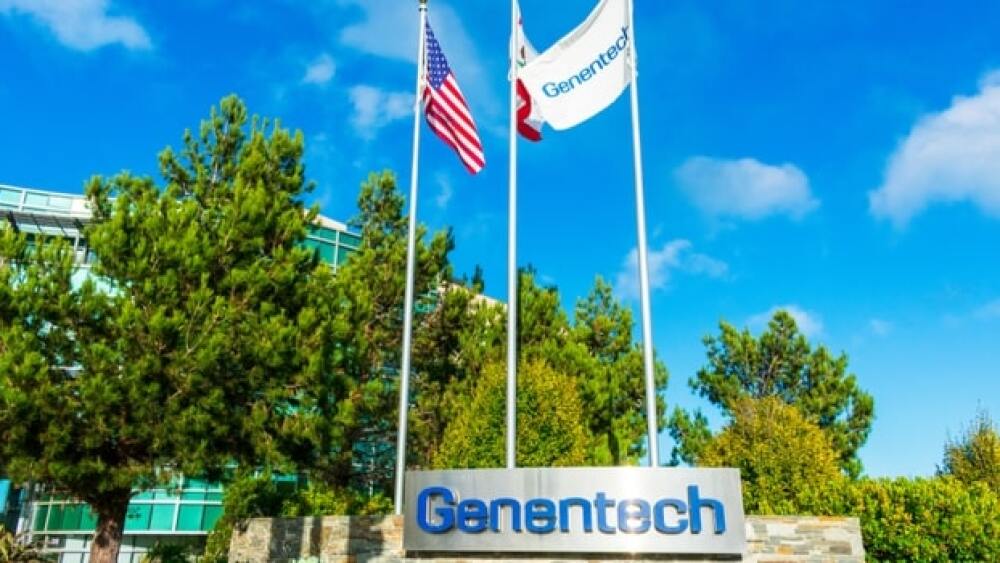Genentech announced new data related to its investigational CD20xCD3 T-cell engaging bispecific antibody intended to treat relapsed or refractory diffuse large B-cell lymphoma (R/R DLBCL).
Courtesy of Michael Vi/Getty Images
Genentech, a member of the Roche group, announced new data on Thursday related to its investigational CD20xCD3 T-cell engaging bispecific antibody, glofitamab, which is intended to treat relapsed or refractory diffuse large B-cell lymphoma (R/R DLBCL).
Lymphoma is the most common type of blood cancer and made up 48% of all new cases of general blood cancers diagnosed in 2021. DLBCL is the most common type of non-Hodgkin lymphoma (NHL) which affects B-lymphocytes, a type of white blood cell that make antibodies. R/R DLBCL denotes a diagnosis in which the cancer has either grown again after a period of remission and/or does not respond to treatment.
Genentech focused on patients with aggressive lymphoma who had previously received a median of three prior therapies. 58.3% of patients included in the trial were refractory to their initial treatment, with 33.1% having undergone CAR T-cell therapy.
After treatment with glofitamab, 39.4% of patients achieved a complete response, meeting the study’s primary efficacy endpoint, and half of patients achieved an overall response. Additionally, the majority of patients who achieved a complete response continued to demonstrate a durable and ongoing complete response at 12 months.
“These data bring us one step closer towards our goal of finding solutions for people with heavily pre-treated diffuse large B-cell lymphoma, which often relapses and becomes more aggressive each time it returns,” said Levi Garraway, M.D., Ph.D., chief medical officer and head of global product development at Genentech. “The potential of glofitamab as a new fixed-duration, readily available treatment could be instrumental to improving outcomes for people with this difficult-to-treat cancer who otherwise have limited options.”
Genentech has submitted the data from the study for approval to the European Medicines Agency and plans to include the data in other submissions to health authorities globally, including the U.S. Food and Drug Administration. The company will present the data for the first time at the 2022 American Society of Clinical Oncology (ASCO) Annual Meeting from June 3-7 and the European Hematology Association (EHA) 2022 Congress from June 9-12.
Aggressive NHL makes up about 60% of all NHL cases in the U.S., according to the Leukemia and Lymphoma Society, making it a high priority for innovative therapeutics. Approved therapies for treatment typically include chemotherapy regimens of four or more drugs that may be supplemented by radiation therapy. Companies like Genentech have been researching not only effective therapeutics, but therapeutics that could serve as monotherapies.
Currently, there are 435 listed studies recruiting for patients with R/R lymphomas. One of those is being run by Adicet Bio, which recently announced positive preliminary data for its R/R B-cell NHL therapeutic ADI-001, a type of CAR T-cell therapy. The Phase I trial included six evaluable patients, and at Day 28 of the study, 67% of the patients treated demonstrated an overall response rate or a complete response.
Bristol Myers Squibb (BMS) also recently announced positive Phase II data from its investigation of Breyanzi, a CAR T-cell therapy for R/R LBCL. The study included patients who were not deemed candidates for high-dose chemotherapy and hematopoietic stem cell transplant. 80% of patients dosed responded to the treatment, with 54% achieving a complete response. Additionally, responses to the treatment were durable, with a median duration response of 12 months.
Other up-and-coming therapeutics for the disease include Selinexor from Antengene. The company recently announced a Phase I/II study evaluating the XPO1 inhibitor in conjunction with lenalidomide and rituximab to treat B-Cell Non-Hodgkin Lymphoma. Nurix Therapeutics also dosed its first patient this month in a Phase I clinical trial of NX-5948, a small molecule degrader, which is intended to treat B-cell malignancies.





